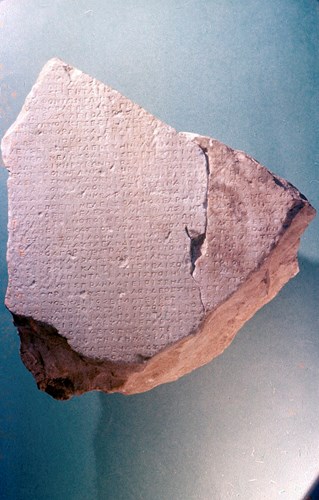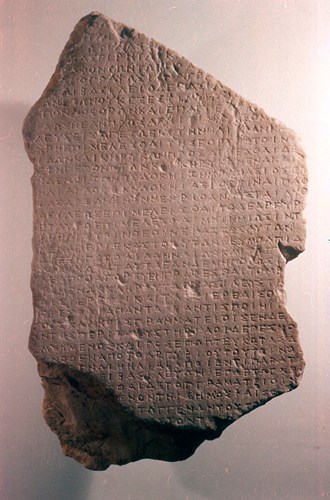An absolute veil of secrecy covered the Mysteries. According to the Homeric Hymn, goddess Demeter instructed the people of Eleusis not to investigate or violate or publicise the content of the ceremonies she taught them. The prohibition survived for a thousand years. As a result, there is almost no useful information on the events behind the sanctuary's walls in any ancient source. The main reason for this deafening silence was the respect for the goddesses, which "binds the tongue". But, since it is always advantageous to help yourself if you expect the gods to assist you, the priests of Eleusis and the magistrates of Athens introduced strict laws to punish those who dared to reveal (intentionally or unintentionally) the content of the Mysteries.
According to a law of Solon, the Athenian boule met every year in the City Eleusinion on the day after the end of the festivities to receive the report of the Archon Basileus on the celebration of the Greater Mysteries and to punish those who had violated the law. The punishment for disrespect to the Mysteries was invariably the death sentence and the confiscation of the offender's property, as happened with Alcibiades, who was accused of mocking the Mysteries on the eve of the departure of the Athenian fleet for Sicily (415 BCE). In addition, of course, to prevent abuses, there was a provision for the offender to be punished if he failed to secure one-fifth of the judges' votes (an indication that he had been unable to convince them of the complaint’s correctness and fairness). Such a failure meant that the accuser had shown disrespect to the goddesses. As a result, he was no longer welcome to the sanctuary of Eleusis and could be put to death if he set foot there.

Inscription with regulations for the Eleusinian Mysteries, sculpture, American School of Classical Studies / Athenian Agora Excavations © American School of Classical Studies at Athens, Archives, Athenian Agora Excavations
In addition to impiety, the arrest of a debtor during the celebration of the Mysteries could incur the death penalty. The violation of the rules concerning the celebration’s proper performance or public order disturbances resulted in heavy fines. A typical example was the case of the logothetes Lycurgus's wife. Lycurgus made it a law that any wealthy woman riding a carriage to Eleusis during the Great Procession should receive a hefty fine. The provocative display of wealth and the commotion created by the women’s rowdy behaviour diminished the procession’s solemnity. Unfortunately, the first Athenian woman to violate the ban was Lycurgus' wife. The orator paid the fine of six thousand drachmas and gave an additional talent to the informant who made the complaint.
Distinguishing the type of offence was vital for the accused. For example, the logographer Andocides fought hard during his trial (in 399 BCE) to prove that placing an olive branch on the altar of Demeter in the City Eleusinion was not a sacrilegious act but a violation of the rules governing the proper celebration. Therefore, he should receive a fine of a thousand drachmas and not a death sentence. Fortunately for the accused, the judges agreed with him and imposed the fine.

Inscription with regulations for the Eleusinian Mysteries, sculpture, American School of Classical Studies / Athenian Agora Excavations © American School of Classical Studies at Athens, Archives, Athenian Agora Excavations
The judges did not rely solely on the written laws of the state but considered the unwritten and traditional rules associated with the Eleusinian cult. The priests of Demeter ensured that the sacred and ancestral law (the so-called “patria”) remained in full force. The members of the Eumolpidae and the Kerykes had the right to arrest, examine, and punish any offender who committed a grave error during the performance of the Mysteries. The accused had no right to appeal to another judicial body. In the early second century BCE, two young Acarnanians accidentally entered the sanctuary of Eleusis with the initiates. They were unaware of the prohibition banning the uninitiated from the sanctuary and innocently asked various questions that betrayed the fact that they were not initiates. Although their act was unpremeditated, the priests sentenced the young men to death.
The priests were also responsible for determining the type of charge for offences that ended up in the Athenian courts and acted as prosecutors in cases where there was no other citizen to bring the matter to justice. After Alcibiades's conviction, the priests and priestesses of Eleusis cursed the condemned general by waving their clothes towards the west as they invoked curses and remained his lifelong and relentless persecutors.
The nature of the violations, however, entailed a risk of inadvertently revealing, during the trial, the content of the Mysteries. The solution was to ensure that all jurors called upon to participate in such trials were initiated.
When all human endeavours failed to protect and preserve the essence of the Mysteries, the faithful could hope for divine intervention. In Roman times the willingness of the courts to impose the death penalty for violating the secrecy of the Mysteries had diminished. A fanatical Epicurean philosopher, determined to prove the non-existence of the gods, managed to enter the Anaktoron, the holiest room inside the Telesterion where the sacred objects were kept and where only the hierophant had access. The courts failed to punish him, but goddess Demeter unleashed her wrath on the hapless culprit, who soon lost his life to some (unspecified) terrible disease.






